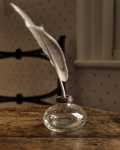 For our last ‘real’ meeting of the year, we went to a member’s home to watch the first two episodes of the Andrew Davies’ ITV adaptation of Sanditon. It is only showing on payTV which most us don’t have – but, anyhow, it is fun to watch something like this together. This will be a short report because we spent most of our time viewing and not discussing – but it is good to document each meeting for our records! And it was an enjoyable meeting. We viewed episode 1, then got our cups of tea or coffee, returned to the sofas where biscuits and cake were readily accessible, and settled in for episode 2.
For our last ‘real’ meeting of the year, we went to a member’s home to watch the first two episodes of the Andrew Davies’ ITV adaptation of Sanditon. It is only showing on payTV which most us don’t have – but, anyhow, it is fun to watch something like this together. This will be a short report because we spent most of our time viewing and not discussing – but it is good to document each meeting for our records! And it was an enjoyable meeting. We viewed episode 1, then got our cups of tea or coffee, returned to the sofas where biscuits and cake were readily accessible, and settled in for episode 2.
Overall the group was more bemused than amused. The first episode was fairly close to Austen, and we liked the casting, thinking most of the characters were well represented by the actors selected for them, from Rose Williams as Charlotte and Kris Marshall as Tom Parker to Turlough Convery for the well-intentioned but buffoonish Arthur. However, the second episode, not surprisingly given the novel was unfinished, strayed from Austen. There are many references/allusions to characters and speeches from other Austen novels – particularly to Lady Catherine de Burgh for Lady Denman, and to a sort of Mr Darcy/Mr Knightley mix for Sidney Parker. We also saw hints of Mr Collins in the aforementioned Arthur. The question is, would Austen have referenced these earlier characters so much in a book that seemed to be moving into a new direction – or is this Davies’ attempt to keep the series anchored in Austen?
One issue of concern was that it seemed to stray somewhat out of the era in which it is set. But, did it? We were uncertain, for example, about the male nude bathing scenes – partly because of the unsubtle reference to the famous Colin Firth wet-shirt scene. However, Jane Austen’s World blog notes that “away from prying eyes, some women felt free to bathe nude.” (Davies didn’t go that far – yet, anyhow.) And this post by a Regency historical fiction novelist provides documentary evidence of nude sea bathing, as does this one. As some supporters have argued, Austen was cheeky enough that she would, they believe, enjoy these scenes. Who knows? We all have “our” Jane don’t we?
The “luncheon party” scene with lady Denman’s crass behaviour and the rotten pineapple seemed rather over-the-top and more farcical, or at least more melodramatic, than we find in Austen. Also, while the term “luncheon” was in use at the time, “luncheon parties” were not, as this blog post from the University of Michigan Library discusses. Still, times may have been changing in the new resorts like Sanditon? Maybe Lady Denman was ahead of the curve?
As black heiress Miss Lambe is mentioned but does not actually appear in the 11 chapters of Sanditon, it is difficult to assess what Austen intended. Radio Times reports this from a discussion with Andrew Davies:
He tells us he was intrigued by the possibilities: “A black character in a Jane Austen, fascinating. Just how will she be received? How will she feel about being plunged into this very provincial set of all-white people?”
He adds: “There were black people in society, and you’ve got examples… there is a black heiress in Vanity Fair. Because George Osborne’s dad wants him to marry her, because she again has lots of money. So that was something that was happening, and obviously Jane Austen thought, let’s include one in my novel.
“But I have no idea really what she was going to do with Miss Lambe, and whether she was going to find love with any of the gentlemen on offer.”
He does believe, however, that her money was going to open doors for her.
The rather jaunty – often jig-like music – was an interesting change from earlier adaptations, but it felt appropriate to the seaside resort tone being evoked. We noted the introduction of tradespeople into the story, and we liked much of the cinematography.
And that’s about as much as I can remember, nearly a week later, of the brief chats that took place on the day!
It was an enjoyable afternoon, and we thank member Anna for suggesting and hosting the event.
Comments, anyone?



 Posted by whisperinggums
Posted by whisperinggums 